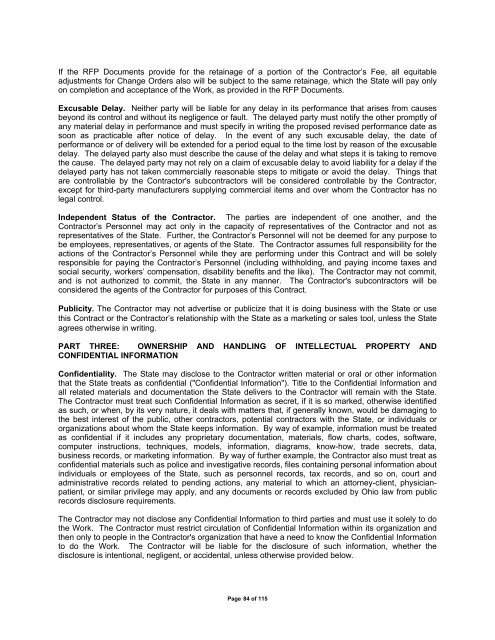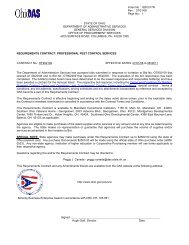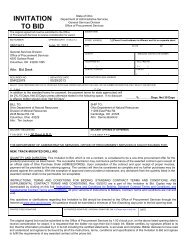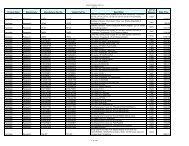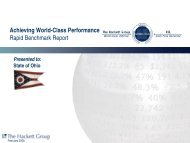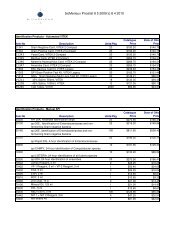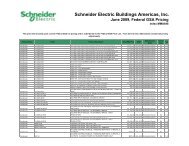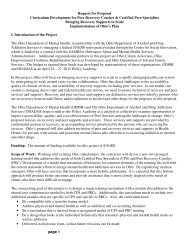REQUEST FOR PROPOSALS RFP NUMBER: 0A1031 DATE ISSUED
REQUEST FOR PROPOSALS RFP NUMBER: 0A1031 DATE ISSUED
REQUEST FOR PROPOSALS RFP NUMBER: 0A1031 DATE ISSUED
Create successful ePaper yourself
Turn your PDF publications into a flip-book with our unique Google optimized e-Paper software.
If the <strong>RFP</strong> Documents provide for the retainage of a portion of the Contractor’s Fee, all equitable<br />
adjustments for Change Orders also will be subject to the same retainage, which the State will pay only<br />
on completion and acceptance of the Work, as provided in the <strong>RFP</strong> Documents.<br />
Excusable Delay. Neither party will be liable for any delay in its performance that arises from causes<br />
beyond its control and without its negligence or fault. The delayed party must notify the other promptly of<br />
any material delay in performance and must specify in writing the proposed revised performance date as<br />
soon as practicable after notice of delay. In the event of any such excusable delay, the date of<br />
performance or of delivery will be extended for a period equal to the time lost by reason of the excusable<br />
delay. The delayed party also must describe the cause of the delay and what steps it is taking to remove<br />
the cause. The delayed party may not rely on a claim of excusable delay to avoid liability for a delay if the<br />
delayed party has not taken commercially reasonable steps to mitigate or avoid the delay. Things that<br />
are controllable by the Contractor's subcontractors will be considered controllable by the Contractor,<br />
except for third-party manufacturers supplying commercial items and over whom the Contractor has no<br />
legal control.<br />
Independent Status of the Contractor. The parties are independent of one another, and the<br />
Contractor’s Personnel may act only in the capacity of representatives of the Contractor and not as<br />
representatives of the State. Further, the Contractor’s Personnel will not be deemed for any purpose to<br />
be employees, representatives, or agents of the State. The Contractor assumes full responsibility for the<br />
actions of the Contractor’s Personnel while they are performing under this Contract and will be solely<br />
responsible for paying the Contractor’s Personnel (including withholding, and paying income taxes and<br />
social security, workers’ compensation, disability benefits and the like). The Contractor may not commit,<br />
and is not authorized to commit, the State in any manner. The Contractor's subcontractors will be<br />
considered the agents of the Contractor for purposes of this Contract.<br />
Publicity. The Contractor may not advertise or publicize that it is doing business with the State or use<br />
this Contract or the Contractor’s relationship with the State as a marketing or sales tool, unless the State<br />
agrees otherwise in writing.<br />
PART THREE: OWNERSHIP AND HANDLING OF INTELLECTUAL PROPERTY AND<br />
CONFIDENTIAL IN<strong>FOR</strong>MATION<br />
Confidentiality. The State may disclose to the Contractor written material or oral or other information<br />
that the State treats as confidential ("Confidential Information"). Title to the Confidential Information and<br />
all related materials and documentation the State delivers to the Contractor will remain with the State.<br />
The Contractor must treat such Confidential Information as secret, if it is so marked, otherwise identified<br />
as such, or when, by its very nature, it deals with matters that, if generally known, would be damaging to<br />
the best interest of the public, other contractors, potential contractors with the State, or individuals or<br />
organizations about whom the State keeps information. By way of example, information must be treated<br />
as confidential if it includes any proprietary documentation, materials, flow charts, codes, software,<br />
computer instructions, techniques, models, information, diagrams, know-how, trade secrets, data,<br />
business records, or marketing information. By way of further example, the Contractor also must treat as<br />
confidential materials such as police and investigative records, files containing personal information about<br />
individuals or employees of the State, such as personnel records, tax records, and so on, court and<br />
administrative records related to pending actions, any material to which an attorney-client, physicianpatient,<br />
or similar privilege may apply, and any documents or records excluded by Ohio law from public<br />
records disclosure requirements.<br />
The Contractor may not disclose any Confidential Information to third parties and must use it solely to do<br />
the Work. The Contractor must restrict circulation of Confidential Information within its organization and<br />
then only to people in the Contractor's organization that have a need to know the Confidential Information<br />
to do the Work. The Contractor will be liable for the disclosure of such information, whether the<br />
disclosure is intentional, negligent, or accidental, unless otherwise provided below.<br />
Page 84 of 115


